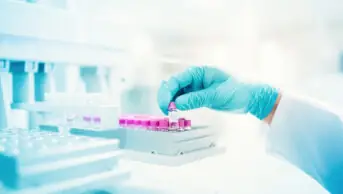
Matej Kastelic / Alamy Stock Photo
Most UK pharmacy professionals say that they do not feel prepared for how genomics may change their day-to-day practice, according to a survey by The Pharmaceutical Journal.
As the health service gears up to offer more personalised medicine through pharmacogenomic testing, the survey of 615 pharmacy professionals found that most respondents (88%) expected to use pharmacogenomics to guide the treatment of patients in future, yet only 10% answered that they were prepared “a great deal” or “a lot” for this change. Just under half (45%) of respondents said they did not feel prepared “at all”.
The survey findings come as a report by the Royal College of Physicians and British Pharmacological Society describes pharmacists as an “an essential component” of the multidisciplinary pharmacogenomic service”.
‘Personalised prescribing: using pharmacogenomics to improve patient outcomes’, published on 22 March 2022 and endorsed by the Royal Pharmaceutical Society (RPS), said that GPs and pharmacists would be “instrumental” to the “broader clinical adoption of pharmacogenomics”.
However, many respondents to The Pharmaceutical Journal’s survey pointed to a lack of training undermining their involvement in genomics. Two-thirds (66%) of respondents said they’d never had any training on pharmacogenomics or genomic medicine.
Health Education England has completed a UK-wide survey of pharmacy professionals to help inform future training and education plans in genomics, which closed on 15 April 2022.
Commenting on The Pharmaceutical Journal’s survey findings, Sophie Harding, pharmacogenomics lead at the RPS, said that there is currently “insufficient training available for pharmacy staff across all healthcare sectors”.
She added: “Many pharmacy staff do not need to be an expert in genomics but they do need to have a suitable level of knowledge and understanding in order to fulfil their day-to-day pharmacy role, which will be impacted by pharmacogenomics.”
Ravi Sharma, director for England at the RPS, said that “there needs to be funded, properly protected learning time in place for pharmacists to upskill” in this area.
“It needs to be equitable, and it needs to be in line with what other medics, nurses and colleagues are going to be getting.”
Tracey Thornley, honorary professor in pharmacy practice at the University of Nottingham, said: “I don’t think the training needs to be over-complicated to make it the new baseline for everybody.”
Pharmacists are “already experts in medicines use, and if all the enablers are in place, [pharmacogenomics] will become the new norm going forward”, Thornley added.
The survey of 615 UK-based pharmacy professionals ran during January and February 2022.
Read the full analysis here: Are pharmacists ready for the genomic revolution?


